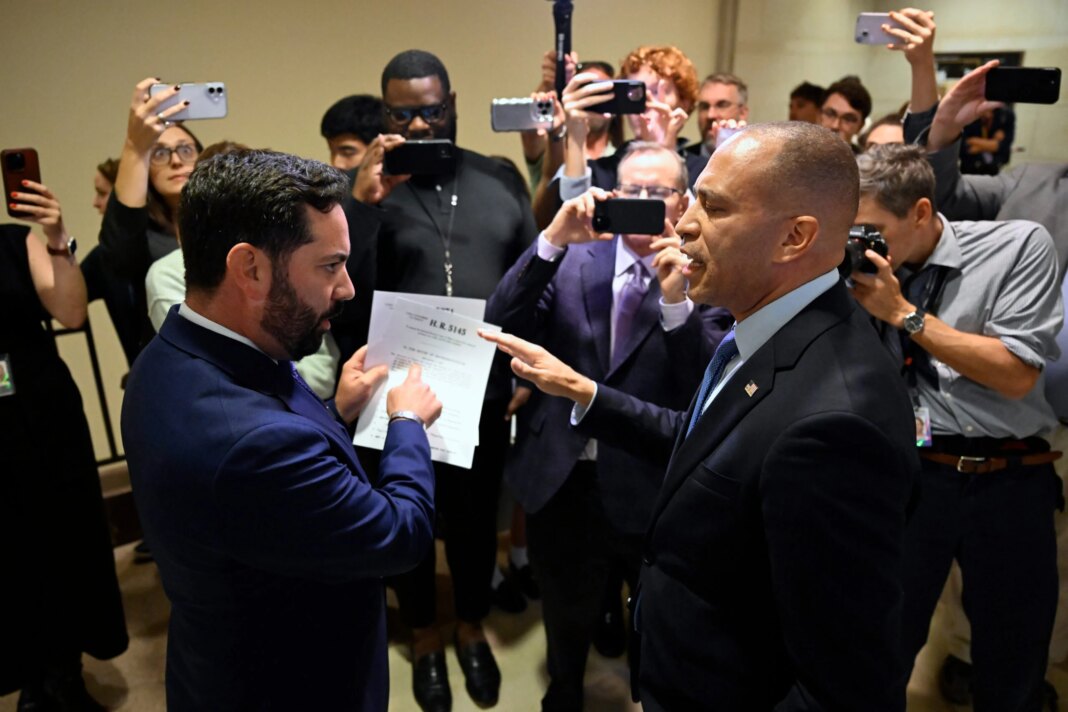The Stalemate in Washington: A Closer Look at the Government Shutdown
In the heart of Washington, a tense standoff has unfolded, marked by a president eager to expand his influence beyond the limits of the executive branch, a Congress entangled in partisan politics, and a minority party scrambling for leverage. On one side, President Donald Trump takes a firm stance on his demands, while on the other, Republicans in Congress hesitate to oppose him directly. This power struggle culminated in an ongoing government shutdown, now stretching into its ninth day, leaving public agencies dormant and hundreds of thousands of federal employees uncertain about their financial futures.
The Breakdown of Trust
As lawmakers convened, frustration simmered. Trust—a foundational element of bipartisan cooperation—has all but evaporated. Representative Brad Schneider, chair of the New Democratic Coalition, articulated this sentiment, stating, “To have good-faith conversations, you have to have trust. There’s a real challenge of trust.” This breakdown complicates negotiations, making even the most straightforward discussions about reopening the government anything but simple.
In the search for solutions, groups of lawmakers have turned to informal meetings, brainstorming dinners, and phone calls. Even as attempts to muddle through the impasse cropped up, the deep schism between the two parties has hindered any semblance of positive progress.
A Stalemate of Hardball Tactics
Interestingly, President Trump and his Republican allies have maintained a clear position: they refuse to negotiate on Democratic demands concerning healthcare benefits until the government is reopened. Senate Majority Leader John Thune emphasized the dilemma, saying, “You can’t take the federal government hostage and expect to have a reasonable conversation on those issues.” This approach paints a stark picture of how disagreements have escalated—no longer simple political disagreements, but rather a battle of wills that takes federal workers hostage in the process.
Democrats, however, have indicated they cannot trust Trump’s word alone. Senator Richard Blumenthal voiced concerns, insisting, “Donald Trump has no respect for law if he can push outside it, so I think we need some safeguards.” Such sentiments encapsulate the growing suspicion and weariness that characterizes the current political climate.
Executive Overreach and Legislative Frustration
Before the shutdown began, conflicts had already surfaced over executive power, particularly regarding the management of congressionally approved budgets. The White House’s recent actions—the cancellation of numerous government contracts and significant cuts to foreign aid through an unconventional process known as “pocket rescission”—have drawn ire from both sides of the aisle. Senator Thom Tillis expressed his frustration with this tactic, emphasizing, “I hate rescissions, to be honest with you, unless they’re congressionally approved.”
The increasing use of rescissions and other unilateral decisions by the executive branch is changing the dynamics of negotiations in Congress. Matt Glassman from the Government Affairs Institute noted, “The president’s use of rescissions was blowing up the underlying dynamic of the bargaining.” This reality has stymied traditional compromise, which is critical for the legislative process, especially in the Senate.
Defining the Dialogue: Health Care Provisions
Among the many issues surrounding the shutdown, healthcare subsidies stand out as a key point of contention. Democrats are pushing for an extension of subsidies for health plans offered under the Affordable Care Act, a demand the Republicans have shown limited enthusiasm to address without prior concessions. However, Trump has expressed a desire for “great health care” for Americans, which could open avenues for negotiation, albeit perilously so.
In a twist that highlights the complexity of this moment, Democrats are also advocating for legal safeguards to limit the executive branch’s ability to rescind funding already approved by Congress. Senator Mike Rounds confirmed that many Republicans might be receptive to such safeguards—indicating potential bipartisan interest, yet the overriding priority remains opening the government.
The Pressure Mounts on Federal Workers
As the shutdown endures, the anxiety for federal employees grows. Dates loom on the calendar, bringing imminent threats of missed paychecks for military personnel and other federal workers. Active-duty military members are set to miss a paycheck soon, which raises concerns about the financial implications for these individuals and their families.
Amidst these troubling developments, House Speaker Mike Johnson highlighted that the House Republicans have already passed a stopgap bill aimed at ensuring that vital government functions continue. There is some chatter about implementing partial government funding legislation to secure military pay, yet the focus remains on pressuring Democrats through various tactics rather than fostering collaboration.
A Game of Political Chicken
As each side doubles down, it appears that lawmakers are prepared to dig in their heels, pushing toward an uncertain brinkmanship. The reluctance to compromise on critical issues further extends the stalemate, leading to a heightened atmosphere of tension where political gamesmanship overshadows the urgent needs of the public.
In this unpredictable landscape, both parties locate themselves at a crossroads. The negotiations moving forward will require not only tactical maneuvering but also a return to the foundational elements of trust and goodwill—qualities that seem all too fragile in today’s political environment.



